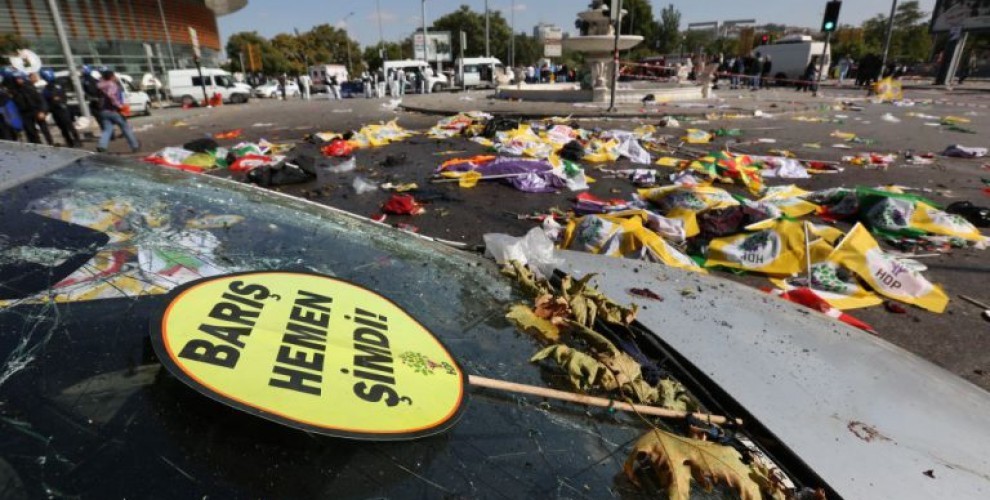Secret EU report: AKP missioned ISIS for Ankara massacre
According to a report by EU Analysis (EU INTCEN), the October 10, 2015 suicide bombing of a peace march in Ankara may have been committed on the orders of the AKP.
According to a report by EU Analysis (EU INTCEN), the October 10, 2015 suicide bombing of a peace march in Ankara may have been committed on the orders of the AKP.

An EU's official intelligence body EUINTCEN report, of which Ahval has obtained a copy, has suggested that the October 10, 2015 suicide bombing of a peace march outside the Ankara train station may have been committed on the orders of Turkey’s ruling Justice and Development Party (AKP).
The bombing, in which two bombers belonging to the Islamic State (ISIS) blew themselves up in the midst of a crowd made up largely of leftists and Kurdish sympathisers, was the deadliest terrorist attack in modern Turkish history, killing 109 civilians and injuring 500 more.
It followed ISIS bombings of a pro-Kurdish political party rally in Diyarbakır on July 5, in which five were killed and over 100 injured, and on a group of leftists in the town of Suruç in Turkey who were planning a trip in solidarity with the Kurdish Syrian town of Kobani on July 20, in which 33 were killed and 104 injured.
Ahval News stated that the three-page long EUINTCEN report was circulated apparently as an urgent, top classified briefing note, dated October 13, 2015 - only three days after the attack.
“The modus operandi of the attack (suicide bombers) points to Da’esh,” report notes, and offers a conclusion:
“Given the circumstances (arriving buses with demonstrators not searched, police almost absent at the huge demonstration), there is reason to believe that in this case, forces within the AKP commissioned the Da'esh operatives.”
The report also described the political situation, in which the Peoples’ Democratic Party (HDP), was desperately seeking to calm down renewed violence in Turkey’s southeast in order to retain its seats in parliament at upcoming November 1 elections by overcoming Turkey’s 10 percent electoral threshold.
On the other hand, the AKP had been deprived of its majority at elections on June 7, and “the last thing Erdoğan really wants at this juncture is a Kurdish peace,” the report said.
At a hearing in the trial over the case in November 2017, the court heard that police had stopped monitoring ISIS bomber Yunus Emre Alagöz 11 days before his brother Yusuf Alagöz carried out the Suruç bombing and three months before he would be one of two bombers involved in the Ankara train station attack.
A lawyer for the prosecution, Doğukan Tonguç Cankurt, said that police had cancelled their phone tapping of Alagöz on the basis of having collected sufficient evidence on him.
“If this tapping had continued, maybe neither the Suruç nor the train station massacres would have taken place,” Cankurt said.
He said that public officials had known what ISIS was doing and they had buried their heads in the sand.
The fact that it took medical teams 44 minutes to reach the scene of the blasts was clear negligence, another lawyer, Ziynet Çelik, said.
There were three ambulances within a short distance of the train station, but according to their GPS records one of them left the scene without taking any wounded demonstrators following the blast, and only 16 wounded out of over 500 were taken to hospital within the first half hour, she said.
In contrast, riot police had arrived on the scene with water cannons within 14 minutes, she said, and at a similar size, but government-endorsed, open-air meeting the year before there had been 141 first aid specialists, 24 ambulances and a crisis centre, Çelik said.
One of the suspects in the trial, Suphi Alpfidan, claimed that several Gaziantep police officers had known about the bombings and had personally known the ringleaders among the Gaziantep ISIS cell that carried them out.
Policemen Tahir Sarıışık of the Intelligence Branch and Bestami Duman of the Anti-Terrorism Branch, who had been named by Alpfidan, testified that they neither knew nor had spoken to any of the suspects in the case.
The new round of hearings on the trial is set on June 12 -13.
In a recent press conference, members of the ''October 10 Lawyers's Committee'' (defence attorneys of the victims) claimed that the case was being dragged deliberately 'to rot' and that the security staff responsible for severe oversights in the surveilllance of the suspects from ISIS were not put on trial in an attempt for a cover up. They accuse the police in the city of Antep for not arresting the suspects despite wiretapping, and 'allowed them' to conduct the massacre.
Left wing Duvar reported on June 9 that Yunus Durmaz, the prime suspect for planning of the Ankara attack was on the watch list of the Police forces in Gaziantep, including having an arrest warrant on him. Nevetheless the police did not arrest him.
Yunus Durmaz is known as an emir of the ISIS in Gaziantep and also accused for planning of both the Suruç and the Ankara bombings. According to the same report on Duvar, there was an arrest warrant issued by an Istanbul court on Durmaz on November of 2013 but the Gaziantep police did not arrest him.
It was reported that Durmaz blew himself up during a police raid to his house in Gaziantep, on 19 May 2016.